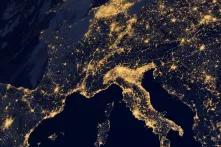
What options do German policymakers have when shaping the European Energiewende debate? The Heinrich Böll Foundation proposes a set of recommendations.
Germany has been criticized for not having included Europe in its Energiewende project. Instead of advocating for a joint energy transformation with its European neighbors, Germany barged ahead regardless of how the influx of cheap wind power would affect the energy systems of its neighbors.
However, tides are shifting. The ongoing EU energy and climate policy negotiations, the so-called “EU Winter Package,” are forcing Germany to take on a stronger European stance on its Energiewende. In fact, Europe has the power to considerably slow down Germany’s Energiewende in the years to come.
A recent study by the Heinrich Böll Foundation makes a number of recommendations on how German policymakers can engage with their European counterparts on energy and climate policy over the next few years.
The ongoing negotiations on Europe’s energy and climate goals by 2030 not only offer an opportunity for German policy makers to shape a Europe-wide debate on the Energiewende, but also to ensure that the European framework supports the further development of the Energiewende at home.
Energy experts agree that Germany’s Energiewende will be cheaper and more efficient if embedded in a fully integrated European electricity market. As such, Germany would need to build less back-up and storage capacities for growing shares of fluctuating wind and solar power capacities and could instead rely on back-up from its immediate neighbors.
Various energy policy interests
An important starting point for a European energy discussion is the realization that this requires more from Germany than a simple copy and paste strategy of its own energy goals throughout the continent. Instead, German policymakers need to acknowledge the various energy policy interests and positions in key European capitals.
Only then, can Germany positively influence the path for European energy and climate discussions by 2030 and frame the narrative of the Energiewende in such a way that it provides answers to its harshest critics as well.
What options do German policymakers have when shaping the European Energiewende debate? The Heinrich Böll Foundation proposes a set of recommendations:
- Policymakers should not just focus on defending renewable energy support schemes. Instead, the key ingredient to developing and shaping the European energy mix after 2020 is the electricity market design. This market must ensure that renewables become truly competitive with conventional energy sources. Policymakers need to highlight the benefits of an integrated European electricity to all European citizens and energy consumers.
- Policymakers need to do their own homework. The most important contribution that Germany can make to advance the European Energiewende is to continue the construction of its national electricity grid and to reduce its reliance on coal in its electricity mix. This would show that Germany is serious about the Energiewende, and make the project less vulnerable to European criticism.
- Policymakers need to address the concerns of their European neighbors seriously. An open and thoughtful dialogue with European Member States can only result in better identification of common synergies and energy policy interests. In addition, discussion about energy should continue at the local level, for example on the management of structural change in coal regions throughout Europe.
- Policymakers need to structure the Energiewende as social policy. Many European citizens have justified concerns about how the Energiewende would negatively affect their lives. If the Energiewende is to become a truly European project, adequate answers in social policy are required, for example when addressing energy poverty and structural change in affected regions.
- Policymakers need to show that Germany is not going it alone. Currently, Germany is often wrongly regarded as the lone advocate for the Energiewende in Europe. Germany needs to build a European coalition with other progressive Energiewende frontrunners to show breakthroughs in the Energiewende are not only made in Germany.
These proposals were discussed at the German Bundestag last month. Let’s hope German policymakers realize that its Energiewende will only succeed if it becomes an integral part of an overall European energy policy.
For those of you who read German, continue reading the full report here.


